By Catherine Bulger with reporting by Kathryn Elliott
On a muggy Friday evening in early June, Trinity School at Greenlawn faculty members welcomed carloads of graduating seniors and their families onto campus, directing them to parking spots along the long lane that runs through the property. Rows of balloon-festooned signs bearing seniors’ names decked the lawn, flanking a small tent with a speaker’s lectern. A ring of carefully spaced chairs held faculty and staff. With everyone in place, Greenlawn’s first outdoor commencement ceremony commenced.
Two Graduate Award winners gave an opening prayer and a valedictory (the Graduate Award is Trinity School’s highest award). Then each cap-and-gowned senior walked from the cars to stand next to his or her sign. Head of School John Lee closed the condensed ceremony with a brief address. Each senior received gifts prepared by the faculty: a personalized coffee mug, a bound booklet of the traditional faculty honorings. a copy of James Joyce’s The Dead and a makeshift diploma because the real ones weren’t available yet—the company that makes them had been closed due to the coronavirus.
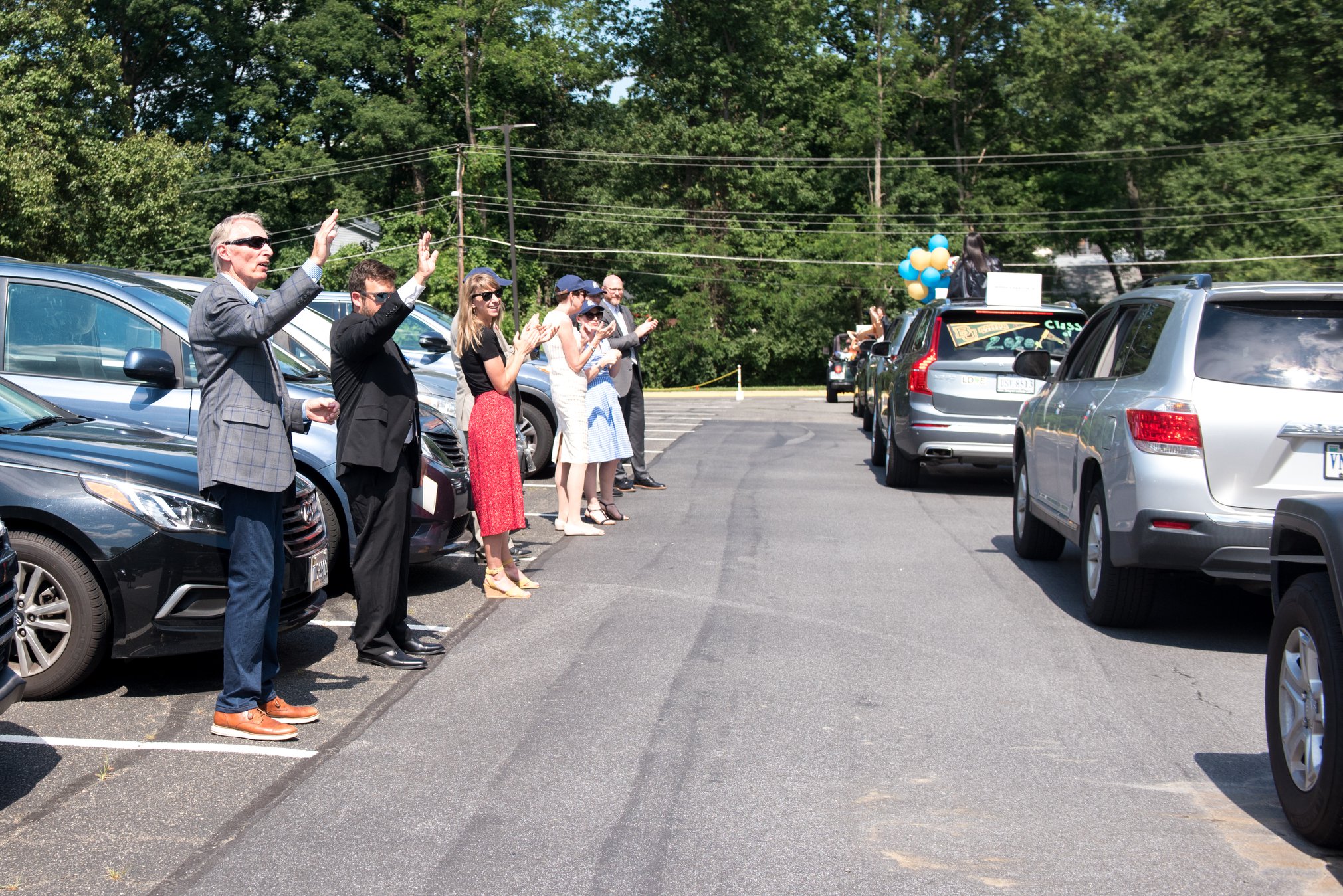 Meadow View faculty send off the newly graduated class of 2020. Photo by Caren Louise Photographs.
Meadow View faculty send off the newly graduated class of 2020. Photo by Caren Louise Photographs.
In Virginia, local officials changed the regulations the day before Trinity School at Meadow View’s commencement, allowing for outdoor gatherings of up to 50 people. Capitalizing on this freedom, the seniors sat outside, six feet apart, with their families remaining in their parked cars. There was no commencement speaker because the event came together so quickly, but the school decided to present three Graduate Awards instead of the usual two, and each recipient gave an address. The graduating seniors walked across the outdoor stage to receive their diplomas. As the seniors departed, other students lined the road in their cars to honk them out into the world.
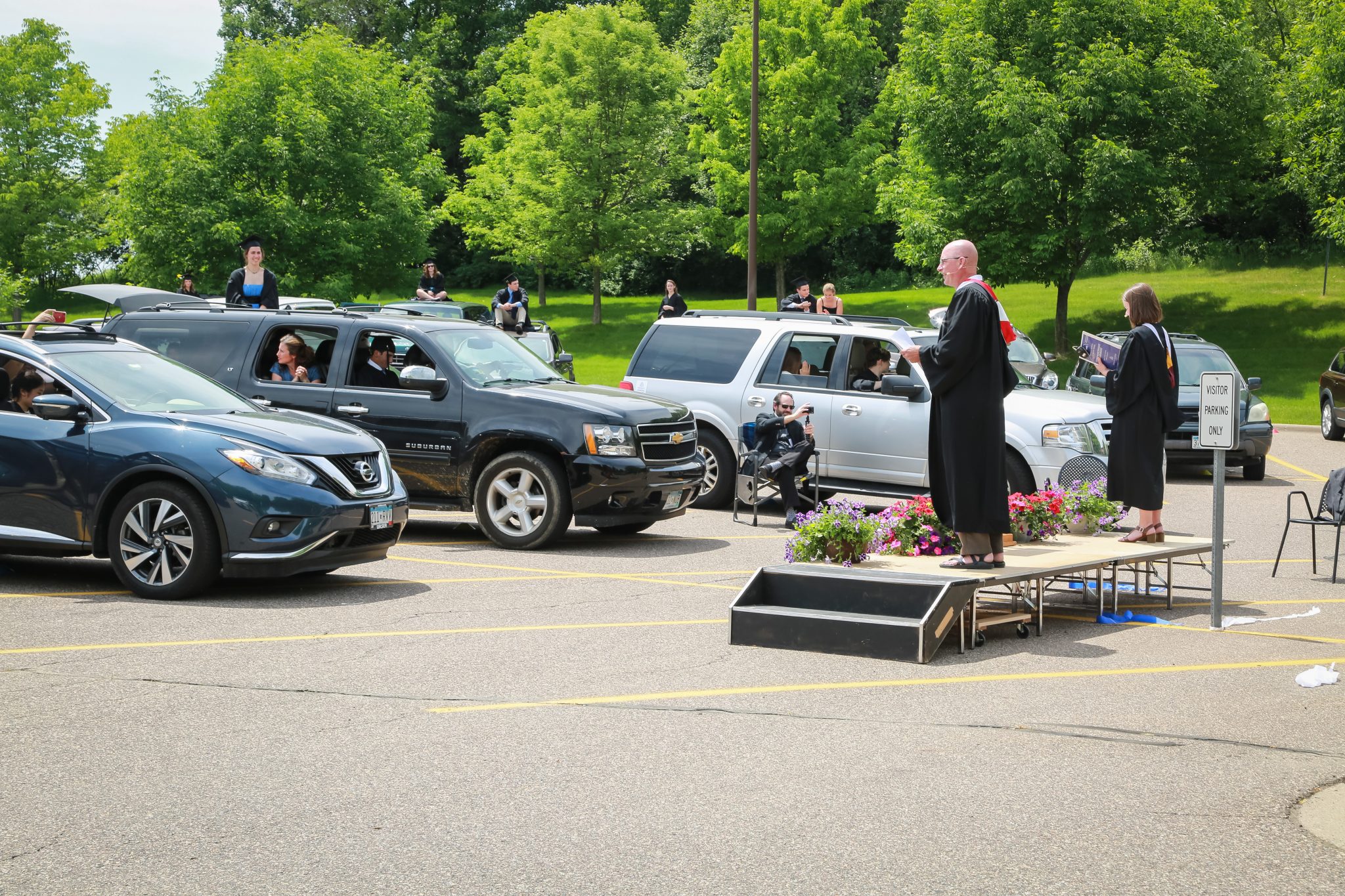 Steve Hendrickson and Beth Schmitz preside over River Ridge's parking lot graduation. Photo by Bob Cunningham.
Steve Hendrickson and Beth Schmitz preside over River Ridge's parking lot graduation. Photo by Bob Cunningham.At Trinity School at River Ridge, the seniors received their diplomas in drive-through fashion as they entered campus. Seniors, families and faculty positioned their cars throughout the large parking lot and stayed inside them for the ceremony. A radio transmitter broadcast the proceedings to all the parked cars. Car horns blared joyfully. Graduates poked their heads out of sunroofs to talk to their classmates. Dr. David Odde, a biochemist at the University of Minnesota, gave a commencement address. When the new graduates departed, the faculty lined their cars into a triumphal corridor for them to pass through.
“A lot of the graduates sat on top of cars, myself included,” said River Ridge senior Abby Theis. “We were able to take off our hats and wave them around.”
“We joked about our senior gift being a giant hand sanitizer bottle that said, ‘In memory of the class of 2020.’”
***
Normally, Trinity hosts a dinner the night before commencement for faculty, seniors and parents. Each senior is individually honored by one of the teachers. River Ridge Head of School Beth Schmitz said, “One of the things seniors and parents expressed was really wanting to hear their classmates honored.” So, instead of a dinner together, River Ridge moved the honorings to a Zoom gathering.
Another popular tradition near the end of the term at Trinity is morning prayer sharings given by the seniors. River Ridge was able to move those online as well. At Greenlawn, the seniors wrote their sharings and recorded themselves giving them, and they were sent to the student body in an email.
Meadow View created a webpage to host the spring fine arts events that normally populate May evenings at Trinity. The website featured recordings of ninth- and tenth-grade musical compositions, dramatic monologues by the senior drama students, photos of senior artwork and a virtual choir produced by the music teacher.
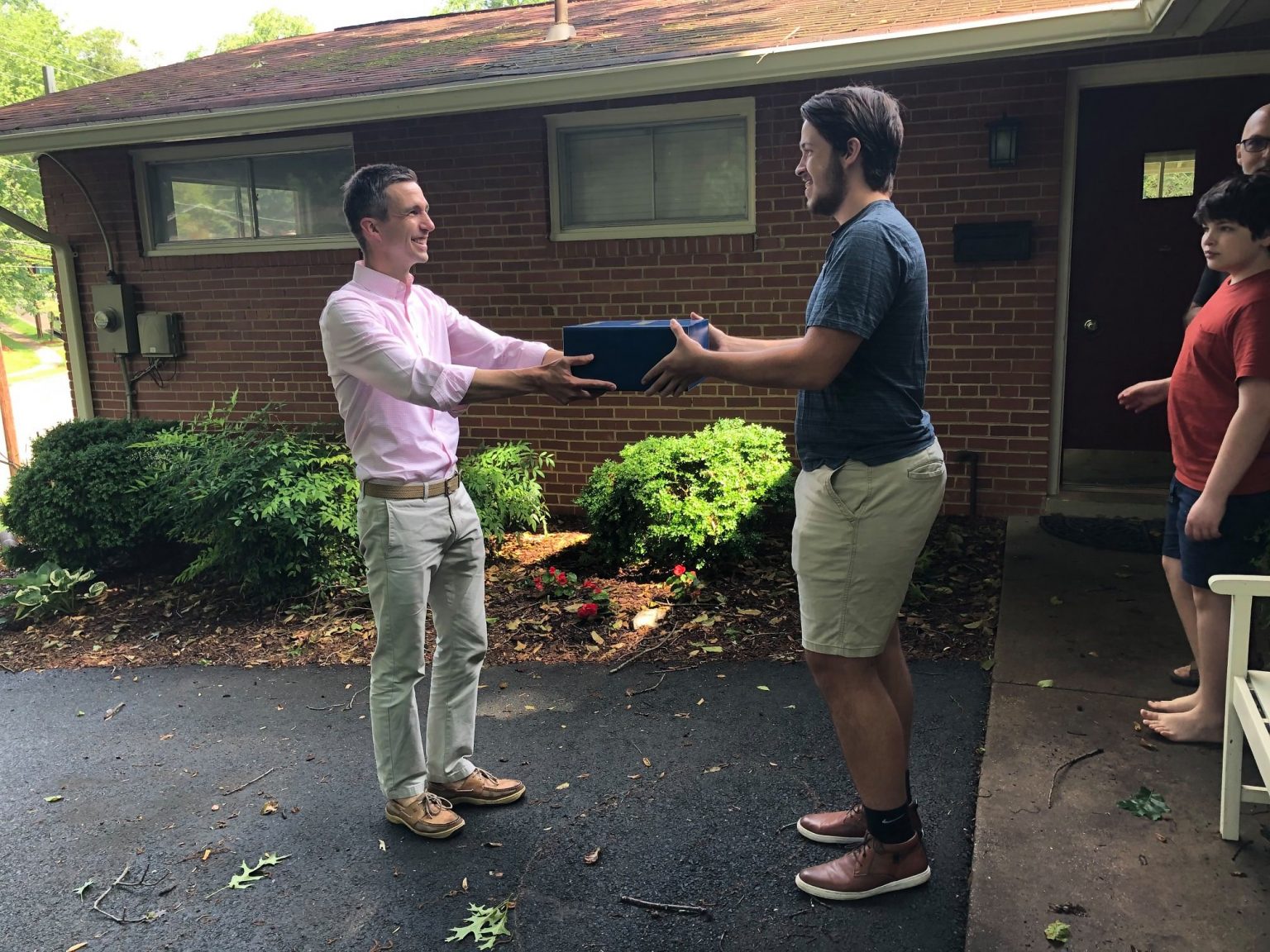 Meadow View faculty delivered gift boxes to the graduating seniors at their homes. Photo courtesy of TSMV.
Meadow View faculty delivered gift boxes to the graduating seniors at their homes. Photo courtesy of TSMV.Because the second senior drama production was cancelled, Greenlawn decided to broadcast two readers’ theaters as Zoom video recordings that premiered on YouTube, with each actor reading his or her part from home. To replace the Greenlawn spring fine arts night, the two art teachers compiled a slideshow of all the eighth-grade and senior artwork.
At River Ridge, three long-serving faculty members retired: Penny Arndt, Debby Salmon and Mary Radtke. Among them, they have over 70 years of teaching experience at Trinity School. Penny has been dean of girls since the school began in 1987. Beth says it was very hard not to be able to honor them in person, but they were able to celebrate the teachers at a virtual end-of-year ceremony on the last day of class. Likewise, Greenlawn had two retiring faculty members to honor: Marge Connolly, a long-time Humane Letters Seminar teacher, and Tom Finke, who helped found the school and served as its head from 1981-83, then again from 2002-04, and is moving from teaching to administration. The faculty honored them at a lunch (with tables spaced out for social distancing) the week after school ended.
***
All the end-of-year celebrations and activities happened on top of the many weeks of pivoting the normal Trinity spring curriculum to an online, scaled-back format. John said, “The instinct among the faculty was to achieve everything we normally achieve, which was great and admirable but also impossible.” Most classes met online, via Zoom, two or three times a week (instead of daily) for about half the usual amount of class time per day. Teachers and students all needed to learn the technology. Ramping up the pressure, some students were sharing computers with siblings and with parents working from home. The school decided to make courses pass/fail and cut back on the normal workload.
Julia described her typical day. “I started with personal morning prayer, worked out for an hour, and then started schoolwork or had class. I would pace while I was reading or jump on the trampoline for 10 minutes in between subjects. Having classes and having morning prayer planned out helped me have a real schedule, which was a struggle for the first three weeks.”
She added, “Most of the senior girls were working six to eight hours a day, most of it on the computer. I sometimes get minor migraines that are light-induced, so the screen time was hard for me, but there’s a nightlight feature that filters out a certain kind of light that bothers people’s eyes.”
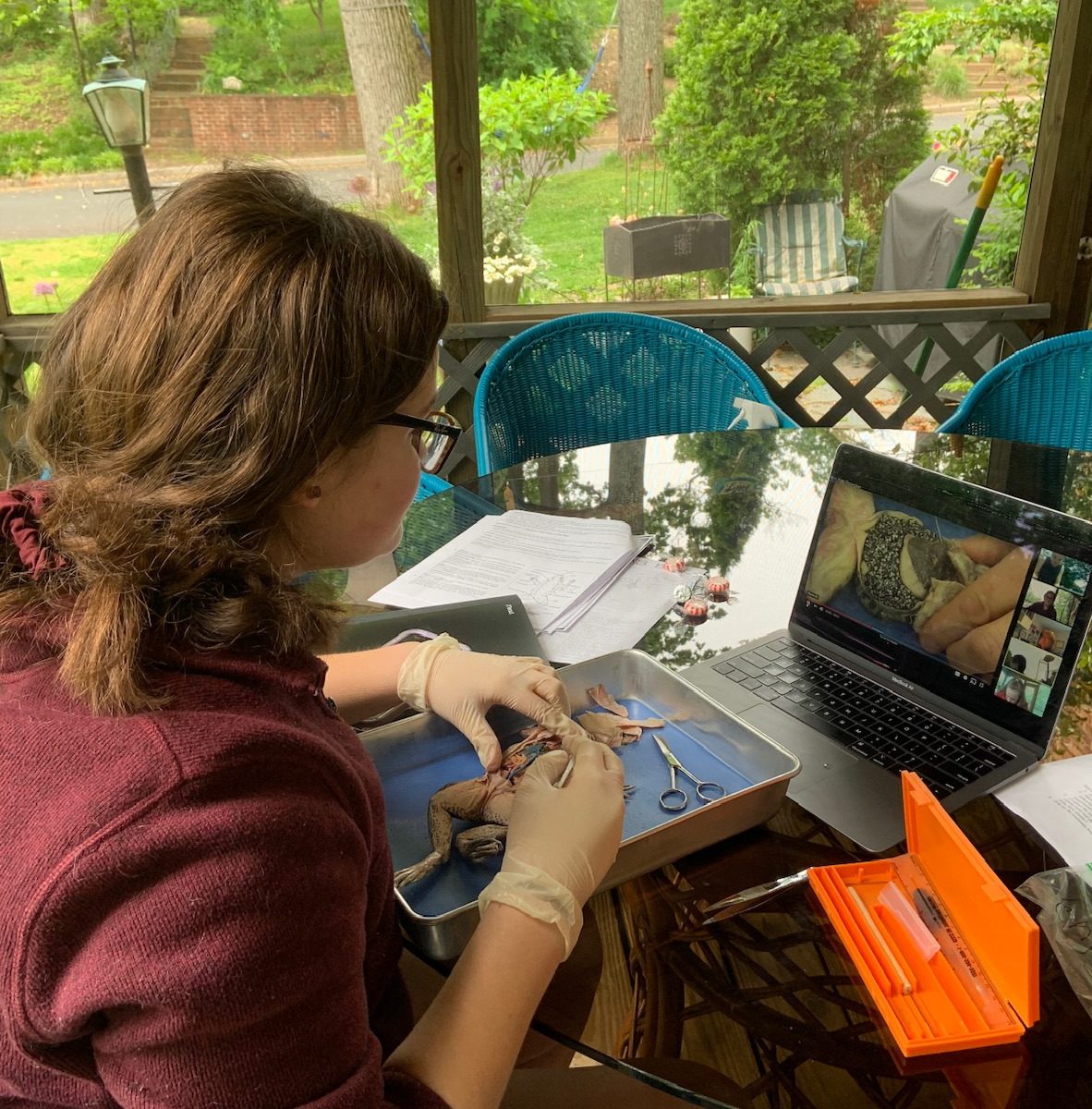 A Meadow View student performs a frog dissection from home, with classmates on Zoom. Photo courtesy of TSMV.
A Meadow View student performs a frog dissection from home, with classmates on Zoom. Photo courtesy of TSMV.The teachers had to adapt their teaching styles dramatically. Lynda Seasly, who teaches girls’ math at Greenlawn, learned how to use an iPad so she could do problems in real time on the screen for her students. Mary Radtke, who taught Scripture (among other things) at River Ridge would put reflection questions in the Google Classroom group chat.
At Meadow View, Tim Dusenbury recorded himself reading several chapters of Dostoevsky’s The Brothers Karamazov out loud for his students to follow along. Marge Connolly learned how to record short videos and upload them to YouTube so that she could explain difficult terms and concepts without wasting precious minutes of class time.
Maintaining motivation to get schoolwork done, alone, at home, was another challenge. Ben Bagiackas, a Greenlawn senior, said, “Because the classes were pass/fail it was much more the guys in my class holding one another to a higher standard. We told each other to put in the effort for the sake of the effort.” Meadow View Head of School Kay Yohe commented, “I was very proud of the extent the students kept up with really rigorous material when it was pass/fail. The vast majority of them really hung in there.”
“Some subjects got harder,” said Joe Whelpley, a sophomore at Meadow View. “The new concepts in precalculus were difficult, like inequality in matrices. Setting it up was harder because we couldn’t do it on our calculators together. You can’t really troubleshoot a friend’s calculator inputs on Zoom.” On the other hand, he added, “Chemistry was pretty unchanged. Other classes like Latin and New Testament were unchanged. They’re either translation or reading.”
But Joe added that the hardest part of distance learning was missing classmates. “The best part about school—that was taken away from us—was the camaraderie. Seeing them on Zoom was not enough. We would text and say, ‘I miss you guys.’ We would try to call one another, but it can be hard to coordinate.”
 Avy Flory, a junior from Meadow View, won the competition at The Dailies to recreate a famous work of art. Avy recreated a self portrait by Frida Kahlo.
Avy Flory, a junior from Meadow View, won the competition at The Dailies to recreate a famous work of art. Avy recreated a self portrait by Frida Kahlo.Abby agreed. “We had a goose chase (scavenger hunt) where we had to take pictures and send them in, and we were in teams, and that really helped. But other than that I didn’t get to see my friends much outside of class, and that was hard. Not being able to talk to our teachers or the students was just really difficult.”
Trinity Schools President Jon Balsbaugh led the charge in formulating distance learning throughout the difficult months, striving to improve the experience. Among other things, he created The Dailies—a cross-campus forum to share art, music, poetry and competitions such as kite-flying and Rube Goldberg competitions. The Dailies’ purpose was purely fun and love of learning.
In a letter to the students explaining The Dailies, Jon wrote, “I encourage you to take time during the day especially to appreciate and respond to beauty. Read the poems and take them to heart. Don’t just glance at the artworks, interact with them. And go to a quiet place, close your eyes, and listen to the pieces of music. Beauty will not be rushed.”
“It was a really nice chance to have something that’s not in my normal curriculum,” said Maggie Kocon, a ninth-grader at River Ridge. “I got a taste of what younger and older students are thinking across all the Trinity Schools.”
***
There’s no denying distance learning was hard on students and faculty and parents alike. “Everybody’s tired and beat up,” said John Lee. “I think people were more mentally and psychologically tired—more mental energy gets used up to keep focus in a way that’s not necessary when you’re rubbing up against people day to day.” Beth Schmitz added, “One thing distance learning did was cast a spotlight on things we take for granted every day, like 30-second conversations, and just being together.”
Julia reflected, “You go through all the grades thinking about what your last day will look like. Our class never had a field day [as seniors] because fall field day was also cancelled. It was really disappointing. But we still had really good Humane Letters conversations. We still had a final math project and figured out how to make small groups work together. I think [the school] did a good job of making sure we were able to still do all the big things.”
Abby added, “I’m not sure I would want to do it again, but there was a lot of beauty in it.”
“I saw the Lord in my students suffering,” Marge Connolly said. “And it was a real suffering for them, especially the seniors—what they had to give up and lay aside, which was really important to them.”
All of that may explain why there was such a release of joy as students, faculty and parents gathered together in parking lots and on the lawn to celebrate the seniors and their completion of a Trinity School education, to celebrate the completion of several months of a Trinity School education as it has never been done before.

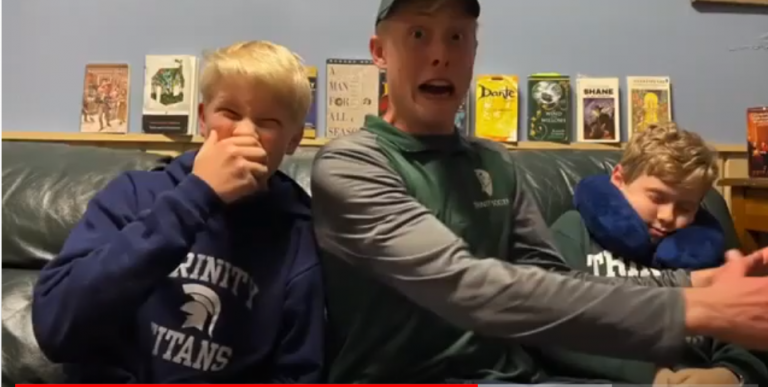
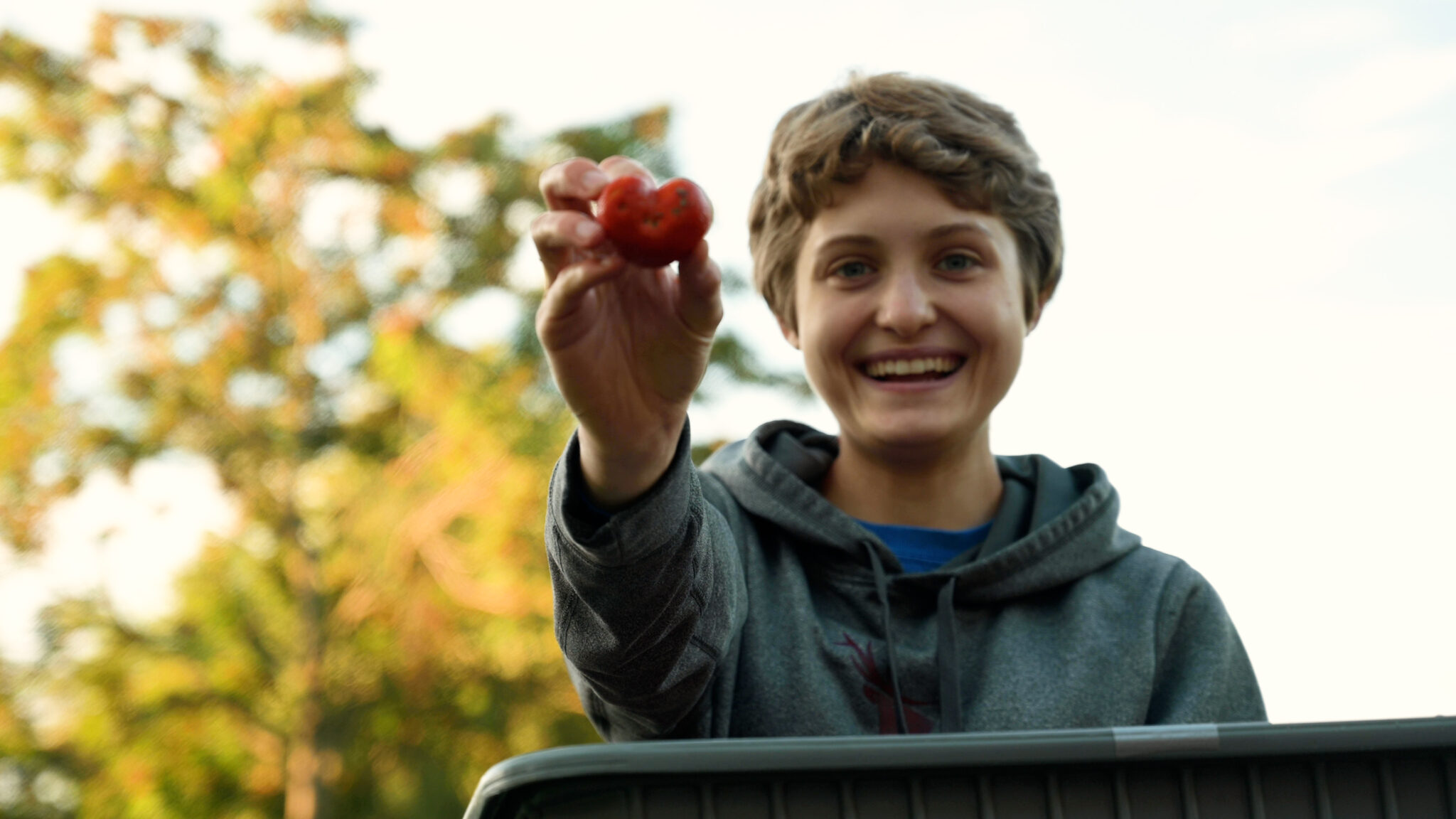
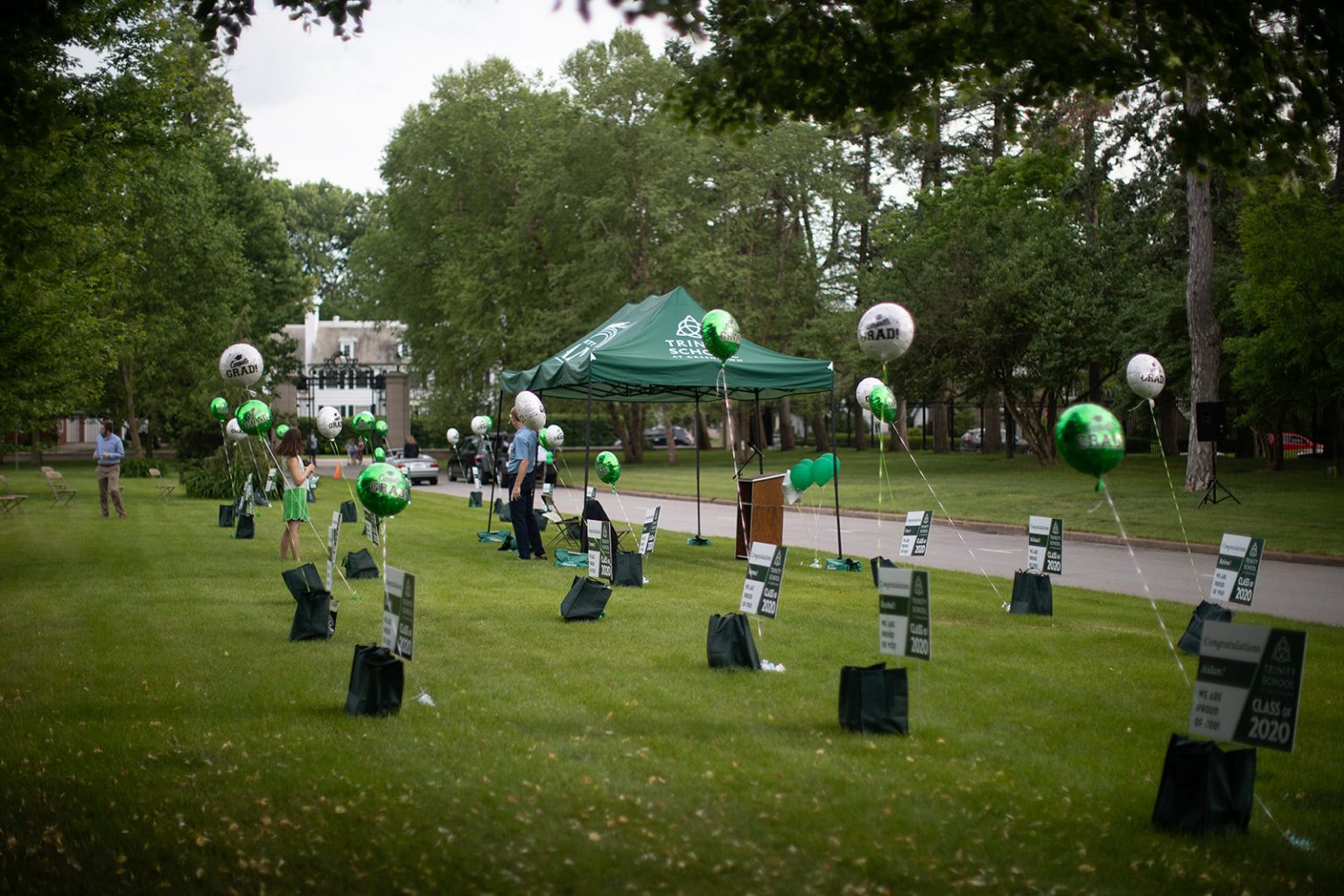
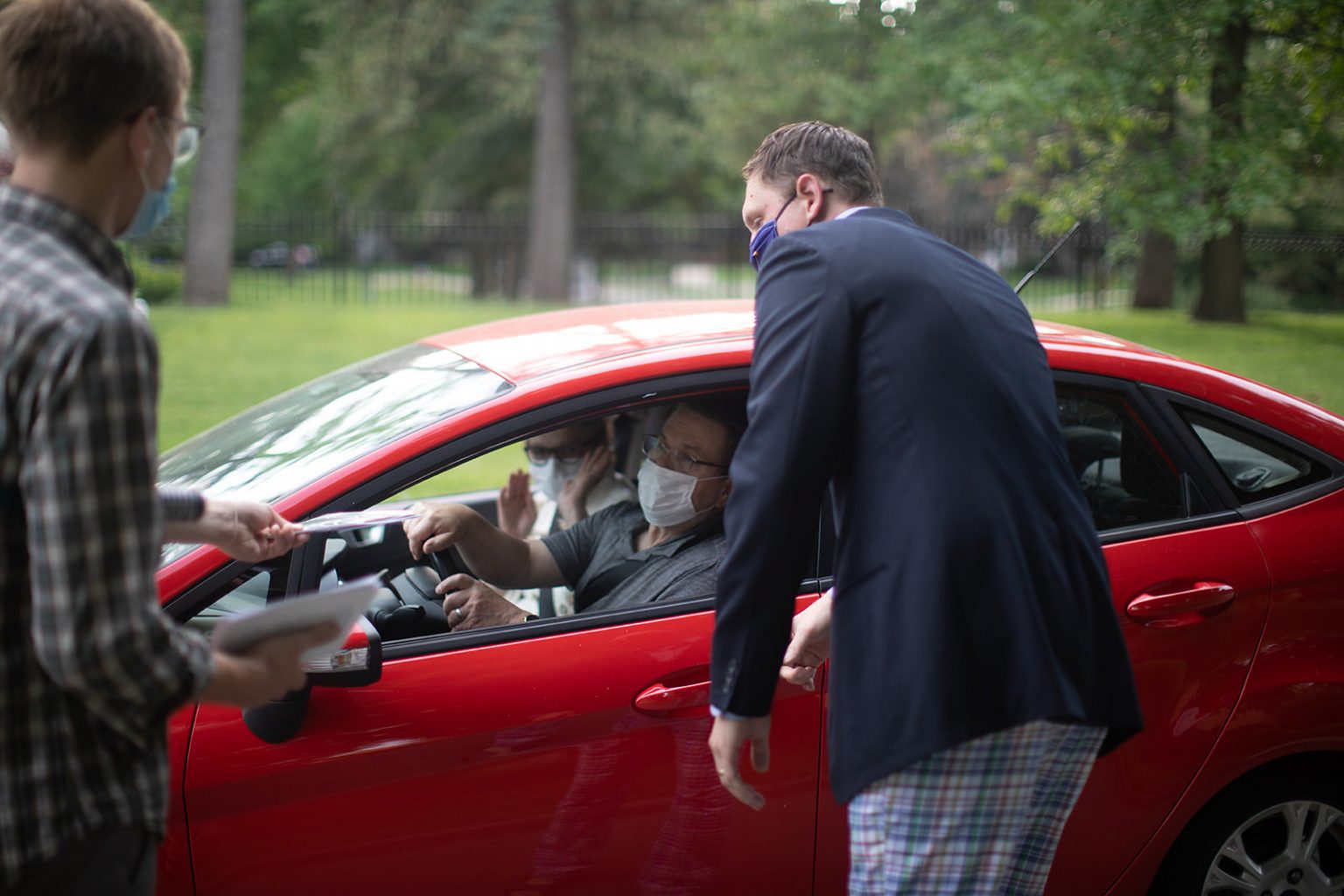
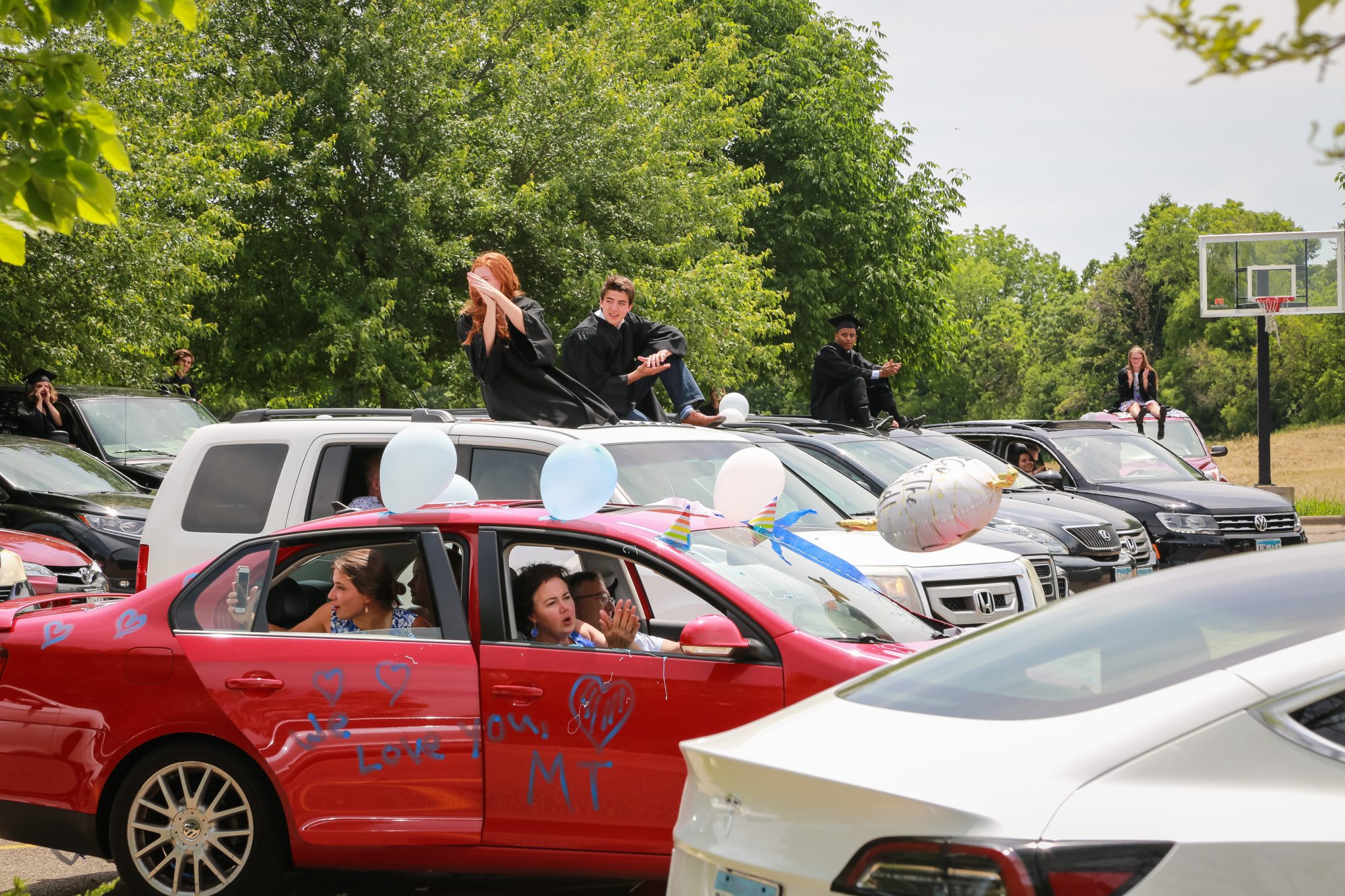
Responses
Ted Vernon says:
July 15th, 2020 at 2:40 PM
I am so proud of and blessed by this year's Trinity students, faculty and parents! They did whatever was necessary to continue the pursuit of the good, the true and the beautiful under particularly challenging circumstances.
Congratulations to you all!
claire mysliwiec says:
July 16th, 2020 at 12:44 PM
I loved this article! It is inspiring to hear about the creativity of all the Trinity teachers and students, as they persevered, in love for one another and love for learning! What creative ways everyone came up with to celebrate and honor the Seniors, despite their limitations due to COVID! Well done, brothers and sisters!
Bruce Wansart says:
July 17th, 2020 at 11:00 AM
The gift of creativity is Gods' gift to us. How beautiful it was used for all the
graduations. We all in People Of Praise as the saying goes, must keep on-
keeping on for the Lord of Hosts is with us!
Leave a Response